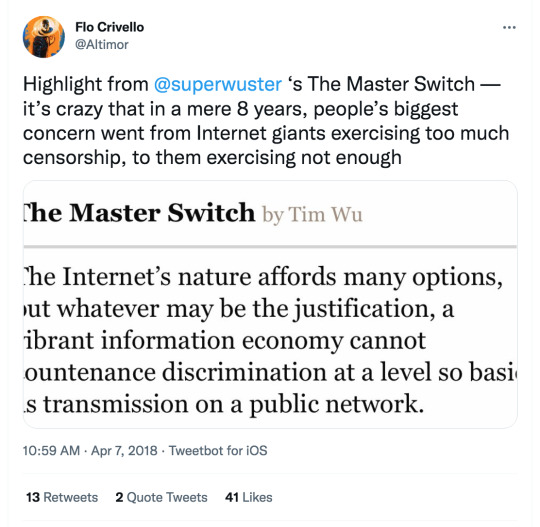#tim wu
Text

____ Tim Wu
95 notes
·
View notes
Text
The Tyranny of Convenience
by Tim Wu
Convenience is the most underestimated and least understood force in the world today. As a driver of human decisions, it may not offer the illicit thrill of Freud’s unconscious sexual desires or the mathematical elegance of the economist’s incentives. Convenience is boring. But boring is not the same thing as trivial.
In the developed nations of the 21st century, convenience — that is, more efficient and easier ways of doing personal tasks — has emerged as perhaps the most powerful force shaping our individual lives and our economies. This is particularly true in America, where, despite all the paeans to freedom and individuality, one sometimes wonders whether convenience is in fact the supreme value.
As Evan Williams, a co-founder of Twitter, recently put it, “Convenience decides everything.” Convenience seems to make our decisions for us, trumping what we like to imagine are our true preferences. (I prefer to brew my coffee, but Starbucks instant is so convenient I hardly ever do what I “prefer.”) Easy is better, easiest is best.
Convenience has the ability to make other options unthinkable. Once you have used a washing machine, laundering clothes by hand seems irrational, even if it might be cheaper. After you have experienced streaming television, waiting to see a show at a prescribed hour seems silly, even a little undignified. To resist convenience — not to own a cellphone, not to use Google — has come to require a special kind of dedication that is often taken for eccentricity, if not fanaticism.
For all its influence as a shaper of individual decisions, the greater power of convenience may arise from decisions made in aggregate, where it is doing so much to structure the modern economy. Particularly in tech-related industries, the battle for convenience is the battle for industry dominance.
Americans say they prize competition, a proliferation of choices, the little guy. Yet our taste for convenience begets more convenience, through a combination of the economics of scale and the power of habit. The easier it is to use Amazon, the more powerful Amazon becomes — and thus the easier it becomes to use Amazon. Convenience and monopoly seem to be natural bedfellows.
Given the growth of convenience — as an ideal, as a value, as a way of life — it is worth asking what our fixation with it is doing to us and to our country. I don’t want to suggest that convenience is a force for evil. Making things easier isn’t wicked. On the contrary, it often opens up possibilities that once seemed too onerous to contemplate, and it typically makes life less arduous, especially for those most vulnerable to life’s drudgeries.
But we err in presuming convenience is always good, for it has a complex relationship with other ideals that we hold dear. Though understood and promoted as an instrument of liberation, convenience has a dark side. With its promise of smooth, effortless efficiency, it threatens to erase the sort of struggles and challenges that help give meaning to life. Created to free us, it can become a constraint on what we are willing to do, and thus in a subtle way it can enslave us.
It would be perverse to embrace inconvenience as a general rule. But when we let convenience decide everything, we surrender too much.
Convenience as we now know it is a product of the late 19th and early 20th centuries, when labor-saving devices for the home were invented and marketed. Milestones include the invention of the first “convenience foods,” such as canned pork and beans and Quaker Quick Oats; the first electric clothes-washing machines; cleaning products like Old Dutch scouring powder; and other marvels including the electric vacuum cleaner, instant cake mix and the microwave oven.
Convenience was the household version of another late-19th-century idea, industrial efficiency, and its accompanying “scientific management.” It represented the adaptation of the ethos of the factory to domestic life.
However mundane it seems now, convenience, the great liberator of humankind from labor, was a utopian ideal. By saving time and eliminating drudgery, it would create the possibility of leisure. And with leisure would come the possibility of devoting time to learning, hobbies or whatever else might really matter to us. Convenience would make available to the general population the kind of freedom for self-cultivation once available only to the aristocracy. In this way convenience would also be the great leveler.
This idea — convenience as liberation — could be intoxicating. Its headiest depictions are in the science fiction and futurist imaginings of the mid-20th century. From serious magazines like Popular Mechanics and from goofy entertainments like “The Jetsons” we learned that life in the future would be perfectly convenient. Food would be prepared with the push of a button. Moving sidewalks would do away with the annoyance of walking. Clothes would clean themselves or perhaps self-destruct after a day’s wearing. The end of the struggle for existence could at last be contemplated.
The dream of convenience is premised on the nightmare of physical work. But is physical work always a nightmare? Do we really want to be emancipated from all of it? Perhaps our humanity is sometimes expressed in inconvenient actions and time-consuming pursuits. Perhaps this is why, with every advance of convenience, there have always been those who resist it. They resist out of stubbornness, yes (and because they have the luxury to do so), but also because they see a threat to their sense of who they are, to their feeling of control over things that matter to them.
By the late 1960s, the first convenience revolution had begun to sputter. The prospect of total convenience no longer seemed like society’s greatest aspiration. Convenience meant conformity. The counterculture was about people’s need to express themselves, to fulfill their individual potential, to live in harmony with nature rather than constantly seeking to overcome its nuisances. Playing the guitar was not convenient. Neither was growing one’s own vegetables or fixing one’s own motorcycle. But such things were seen to have value nevertheless — or rather, as a result. People were looking for individuality again.
Perhaps it was inevitable, then, that the second wave of convenience technologies — the period we are living in — would co-opt this ideal. It would conveniencize individuality.
You might date the beginning of this period to the advent of the Sony Walkman in 1979. With the Walkman we can see a subtle but fundamental shift in the ideology of convenience. If the first convenience revolution promised to make life and work easier for you, the second promised to make it easier to be you. The new technologies were catalysts of selfhood. They conferred efficiency on self-expression.
Consider the man of the early 1980s, strolling down the street with his Walkman and earphones. He is enclosed in an acoustic environment of his choosing. He is enjoying, out in public, the kind of self-expression he once could experience only in his private den. A new technology is making it easier for him to show who he is, if only to himself. He struts around the world, the star of his own movie.
So alluring is this vision that it has come to dominate our existence. Most of the powerful and important technologies created over the past few decades deliver convenience in the service of personalization and individuality. Think of the VCR, the playlist, the Facebook page, the Instagram account. This kind of convenience is no longer about saving physical labor — many of us don’t do much of that anyway. It is about minimizing the mental resources, the mental exertion, required to choose among the options that express ourselves. Convenience is one-click, one-stop shopping, the seamless experience of “plug and play.” The ideal is personal preference with no effort.
We are willing to pay a premium for convenience, of course — more than we often realize we are willing to pay. During the late 1990s, for example, technologies of music distribution like Napster made it possible to get music online at no cost, and lots of people availed themselves of the option. But though it remains easy to get music free, no one really does it anymore. Why? Because the introduction of the iTunes store in 2003 made buying music even more convenient than illegally downloading it. Convenient beat out free.
As task after task becomes easier, the growing expectation of convenience exerts a pressure on everything else to be easy or get left behind. We are spoiled by immediacy and become annoyed by tasks that remain at the old level of effort and time. When you can skip the line and buy concert tickets on your phone, waiting in line to vote in an election is irritating. This is especially true for those who have never had to wait in lines (which may help explain the low rate at which young people vote).
The paradoxical truth I’m driving at is that today’s technologies of individualization are technologies of mass individualization. Customization can be surprisingly homogenizing. Everyone, or nearly everyone, is on Facebook: It is the most convenient way to keep track of your friends and family, who in theory should represent what is unique about you and your life. Yet Facebook seems to make us all the same. Its format and conventions strip us of all but the most superficial expressions of individuality, such as which particular photo of a beach or mountain range we select as our background image.
I do not want to deny that making things easier can serve us in important ways, giving us many choices (of restaurants, taxi services, open-source encyclopedias) where we used to have only a few or none. But being a person is only partly about having and exercising choices. It is also about how we face up to situations that are thrust upon us, about overcoming worthy challenges and finishing difficult tasks — the struggles that help make us who we are. What happens to human experience when so many obstacles and impediments and requirements and preparations have been removed?
Today’s cult of convenience fails to acknowledge that difficulty is a constitutive feature of human experience. Convenience is all destination and no journey. But climbing a mountain is different from taking the tram to the top, even if you end up at the same place. We are becoming people who care mainly or only about outcomes. We are at risk of making most of our life experiences a series of trolley rides.
Convenience has to serve something greater than itself, lest it lead only to more convenience. In her 1963 classic, “The Feminine Mystique,” Betty Friedan looked at what household technologies had done for women and concluded that they had just created more demands. “Even with all the new labor-saving appliances,” she wrote, “the modern American housewife probably spends more time on housework than her grandmother.” When things become easier, we can seek to fill our time with more “easy” tasks. At some point, life’s defining struggle becomes the tyranny of tiny chores and petty decisions.
An unwelcome consequence of living in a world where everything is “easy” is that the only skill that matters is the ability to multitask. At the extreme, we don’t actually do anything; we only arrange what will be done, which is a flimsy basis for a life.
We need to consciously embrace the inconvenient — not always, but more of the time. Nowadays individuality has come to reside in making at least some inconvenient choices. You need not churn your own butter or hunt your own meat, but if you want to be someone, you cannot allow convenience to be the value that transcends all others. Struggle is not always a problem. Sometimes struggle is a solution. It can be the solution to the question of who you are.
Embracing inconvenience may sound odd, but we already do it without thinking of it as such. As if to mask the issue, we give other names to our inconvenient choices: We call them hobbies, avocations, callings, passions. These are the noninstrumental activities that help to define us. They reward us with character because they involve an encounter with meaningful resistance — with nature’s laws, with the limits of our own bodies — as in carving wood, melding raw ingredients, fixing a broken appliance, writing code, timing waves or facing the point when the runner’s legs and lungs begin to rebel against him.
Such activities take time, but they also give us time back. They expose us to the risk of frustration and failure, but they also can teach us something about the world and our place in it.
So let’s reflect on the tyranny of convenience, try more often to resist its stupefying power, and see what happens. We must never forget the joy of doing something slow and something difficult, the satisfaction of not doing what is easiest. The constellation of inconvenient choices may be all that stands between us and a life of total, efficient conformity.
2 notes
·
View notes
Quote
As William James observed, we must reflect that, when we reach the end of our days, our life experience will equal what we have paid attention to, whether by choice or default. We are at risk, without quite fully realizing it, of living lives that are less our own than we imagine.
Tim Wu, The Attention Merchants: The Epic Scramble to Get Inside Our Heads
6 notes
·
View notes
Quote
The problem is that, as every individual task becomes easier, we demand much more of both ourselves and others. Instead of fewer difficult tasks (writing several long letters) we are left with a larger volume of small tasks (writing hundreds of e-mails). We have become plagued by a tyranny of tiny tasks, individually simple but collectively oppressive.
Tim Wu
0 notes
Text
You're Cassandra Cain. Your adoptive mom has a homoerotic relationship with a woman who has a homoerotic relationship with your bio mom.
You take that weird relationship and then form your own weird relationship by having a homoerotic relationship with your brother's ex
2K notes
·
View notes
Text


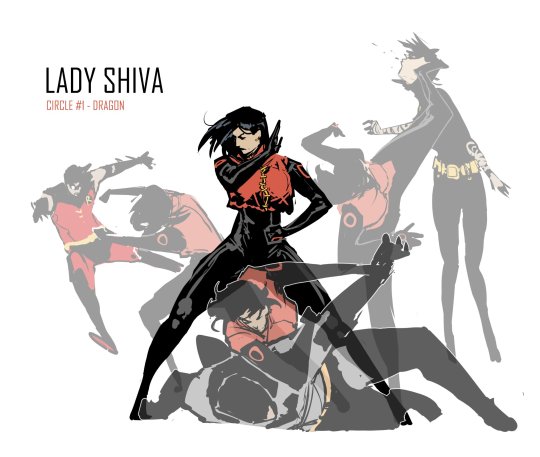
Lady Shiva + The Capeless Crusaders by Nikola Čižmešija
#nikola cizmesija#dc comics#lady shiva#sandra wu san#batman#bruce wayne#batgirl#cassandra cain#robin#tim drake
1K notes
·
View notes
Text
One sec I need to talk about Shiva.
Lady Shiva was introduced in Richard Dragon: Kung Fu Fighter in the 70s. She was a traveling martial artist hellbent on getting revenge for her sister, who she believed had been killed by Richard Dragon. She lured Dragon into a trap, revealed herself as Carolyn's sister, and tried to fight him to the death. Once she realized that Dragon had nothing to do with it, that Cravat and The Swiss (unimportant villain characters, they killed Carolyn) had been the ones to kill her sister, she helped Dragon defeat the villain (by giving him her shiny belt so he could redirect the beam of a deadly laser that was being pointed at them while they were fighting, don’t even ask) and Richard Dragon and Lady Shiva became allies, friends even. Dragon convinced her it would be a waste to kill Cravat and told her that he had killed the Swiss himself. She accepted this. They shook hands. This all took place over the course of one issue of Richard Dragon: Kung Fu Fighter. It took ONE issue for Shiva to go from antagonist to ally. She then tagged along with Richard because she liked the adventures he got up to, the danger, the challenge, and the thrill of it. Richard even called her later on when he needed help on a different adventure. What I’m saying is she didn’t start out as evil.

Okay, so what do we know about Shiva so far? She’s a thrill-seeking peripatetic martial artist of great capacity and skill. She cared about her sister. She’s willing to kill. She’s an adventurer and a valuable ally. Great. Moving on.
The Question 1987 features THE Lady Shiva. A character capable of both ruthlessness and mercy, cruelty and tenderness. A curious, thrill-seeking, teasing character. She was vicious and nonpartisan and she was working as a mercenary for hire. But she was an ally, even when she was beating the shit out of Vic. She loved the O Sensei. You can tell she even cared about Vic in her way. I’m not saying she had a heart of gold, or that there weren’t tropes she fell into. She wasn’t and there were. But she was a fairly well-rounded, morally gray character that played a key role wherever she showed up. She was closer to a non-traditional anti-hero than anything else. Idfk, just go read The Question.
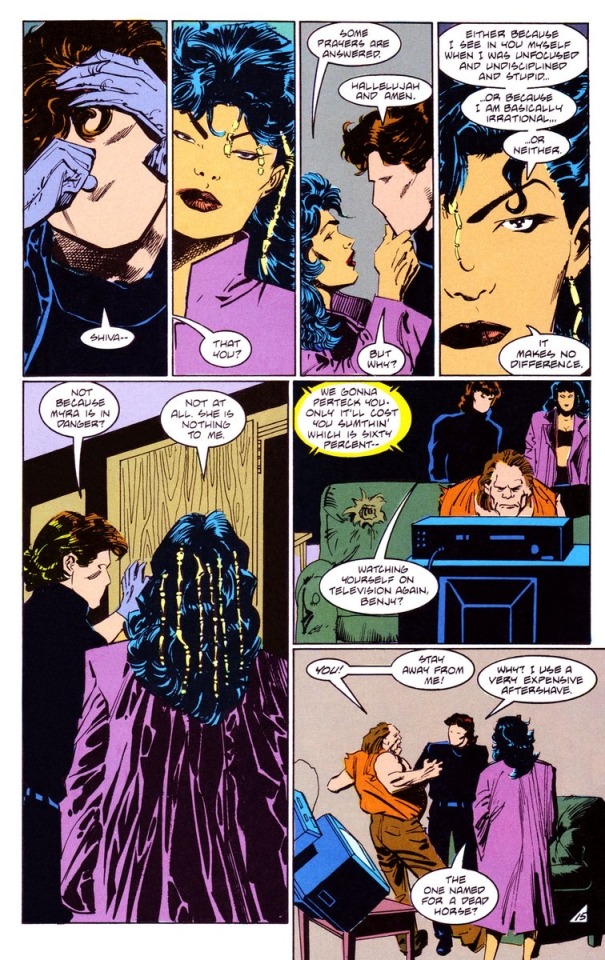
I read a tvtropes article describing Lady Shiva as “an archetypical Dragon Lady, complete with sinister motivations and exotic sex appeal,” which… she isn’t. She subverted this trope in several ways actually. She never had “sinister motivations” until Chuck Dixon got his grubby little hands on her. Her motivations were pretty neutral. She had her own set of principles, she was very morally gray. She wanted to travel and fight worthy opponents on her adventures for the thrill of it. She seemed to operate mostly on personal whims, and on the basis of building worthy rivals, out of love for the art of combat. And she didn’t use her sex appeal for shit (until the Richard Dragon reboot comic kms), she didn’t tolerate sexual advances or objectification. She just WAS NOT a conniving temptress, I don't understand where this misperception came from (but I do blame Dixon, I’ll get to that in a sec).
This same article states that she began as the arch-nemesis of Richard Dragon? Unless you’re accepting the version of the two of them from the very short lived Richard Dragon 2004 series as their canonical relationship then NO she didn’t. But I digress.
There was a marked change in the way Lady Shiva was written by the time Robin (1991) came out, this is where her character starts to lean towards the Dragon Lady trope imo. She also weirdly, and maybe arguably, leans more into traditional femininity while at the same time being written as more wild and uncontrollable. Chuck Dixon seemed to fundamentally misunderstand Lady Shiva as a character. He turned her (sometimes ironic) disdain for brutes who wouldn’t last a second in a fight with her into stereotypical womanly haughtiness. He turned her capacity for ruthlessness into bloodlust. And he made her into a conniving, somewhat deranged, villainous woman, tempting our young hero towards evil (oh my!). Again, I’m not saying she ever had a heart of gold, but Dixon changed core character traits (namely her respect for other people's personal code) to turn her into a villain.
“Kill him, little bird. Kill him and become a predator…Aren’t you my weapon? My instrument of death? Say you are mine.” Like?? She would not fucking say that, respectfully.
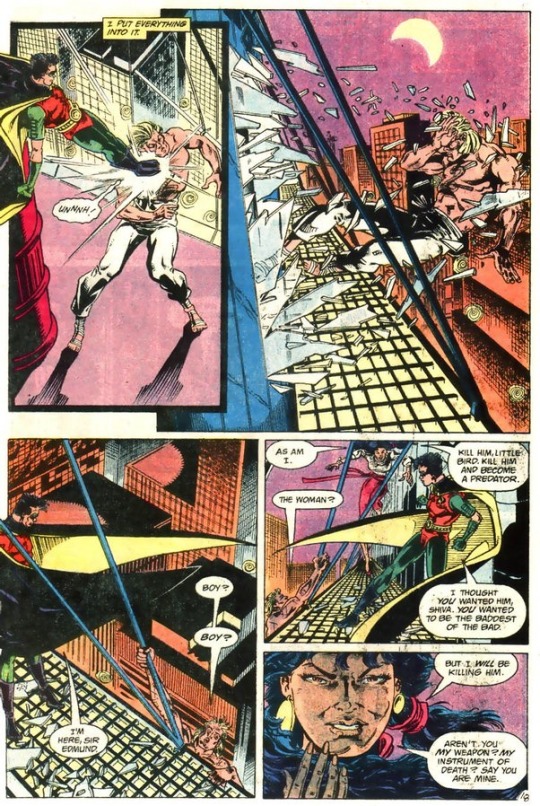
That isn’t even to mention Richard Dragon (2004) where Dixon turned Shiva’s relationship with Dragon into a resentful, sexually charged dick-measuring contest.
Even so, I don’t entirely hate Shiva as a villain, especially in Batgirl (2000). Pucketts Shiva is a bit less egregious imo. So she’s a passively suicidal evil mentor-figure who wants Cass to be a killer like her. Whatever, I can get on board with that I guess. I can enjoy it because I love Cass and this is a great comic run. But the retcon that–Listen, THE RETCON THAT IS SHIVA’S SISTER BEING KILLED BY DAVID CAIN, SHIVA DESCRIBING THIS AS FREEING, SAYING SHE’S GRATEFUL, THEN AGREEING TO GET PREGNANT WITH HIS CHILD IN RETURN?? This boils my blood. Shiva, who was introduced as somebody who cared about getting revenge for her dead sister. Shiva, for whom freedom and autonomy were core character traits. That Shiva?? That Shiva is relieved her sister is dead and is willing to carry her sister's killer's child to term?? What the fuck?
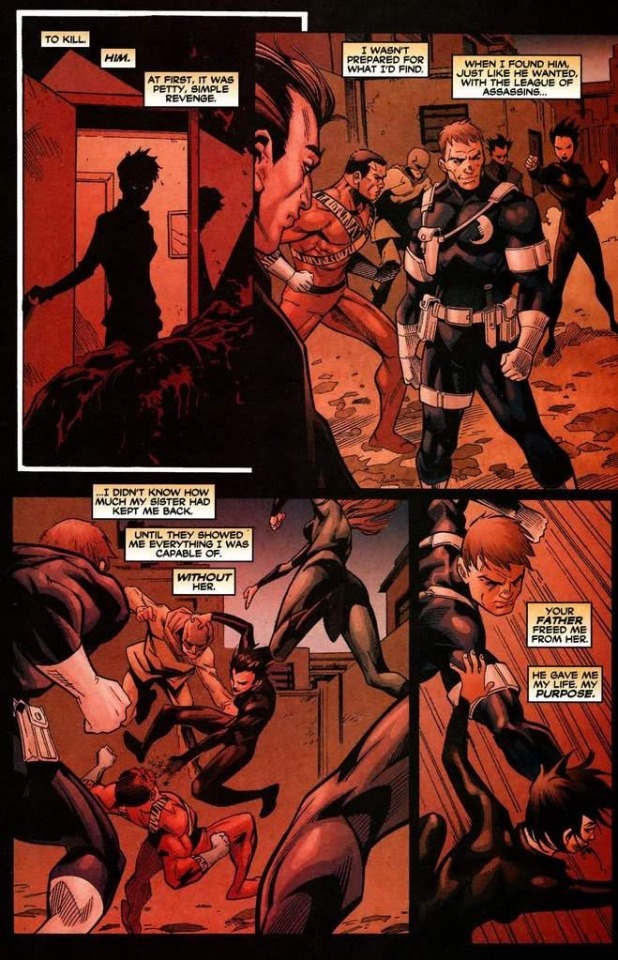
I hate it. I don’t understand it. Why would you take a complex character who makes it difficult to tell who she really cares about, and flatten them into somebody incapable of love?
Okay I’m done, this is getting too long and I don’t even want to get started on New 52 era Shiva. I don’t have a conclusion, I’m just annoyed. Thanks for reading. The Question (1987) is NOT a perfect comic but if you’re interested in Shiva please please please check it out, it’s very moody and philosophical, noir-esque. Also Chuck Dixon suck my dick.
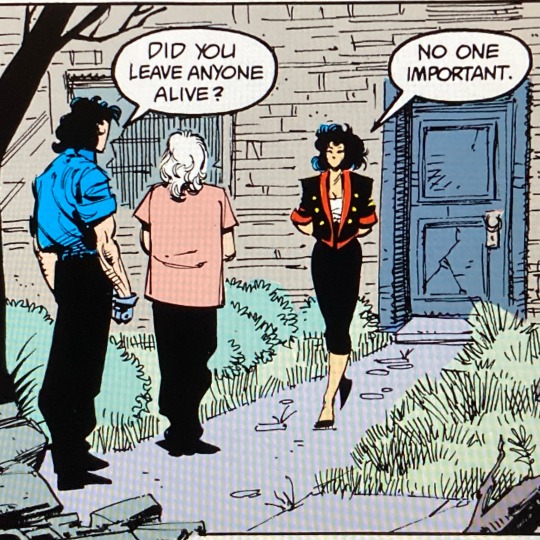
#lady shiva#the question#vic sage#tim drake#chuck dixon#Chuck Dixon anti#denny o'neil#shiva#sandra wu san#90s comics#70s comics#cass cain#the question 1987#richard dragon#david cain#dc comics#dc characters#dc meta#80s comics#please forgive how rambling and disjointed this sounds#and the writing quality is just not there but I have a point!!
74 notes
·
View notes
Text
I'm thinking of a Batkids being biologically Bruce's kids (and no capes maybe) AU, so here are some of my thoughts:
Bruce and Selina have Dick when they're 20, together for a few years, but separate and share custody.
When Dick is 8, Bruce has Cass and Jason with Lady Shiva after a fling or something, Lady Shive signs all rights over to Bruce.
3 years later, Bruce and Selina are together again and have Tim, the two split again after a few years.
Tim's 5 when Bruce and Talia are married and have Damian. The two are together for about 4-5 years before getting divorced, Talia takes Damian and Jason (He had gotten close to Talia and is a huge mamas boy). She moves back to her home, the 3 are there until Damian is 10, when Talia and them move back to America. The boys move back in with Bruce while Talia lives in Metropolis, running the new branch of her families company.
Barbara and her dad are family friends, she's a few years older than Dick and is like a big sister to the others.
Steph is a year older than Tim. They meet at the park, and the first meeting can mirror that of the comics.
Duke can be fostered still or be a friend Damian makes by meeting him at some point.
Bruce and Oliver are friends from the boarding school they went to (may or may not have been each others first experience with a boy). This friendship can be how Bruce's kids know Oliver's kids.
Bruce met Clark at a Gala. They become friends cause Bruce finds Clark the least annoying reporter (along with Lois).
No capes AU can have Bruce's parents not be dead, Alfred is still the best and is like a second dad to Bruce and grandparent to the kids.
Other JLA, Titans, Outlaws, YJ, and TT members and their friendships with the Batfam can be decided with whatever y'all wanna do with this.
Can apply any ship you want! (No Batcest tho, for obvi reasons).
#batman#dc#jason todd#dick grayson#bruce wayne#tim drake#damian wayne#clark kent#talia al ghul#selina kyle#lady shiva#sandra wu san#oliver queen#lois lane#duke thomas#stephanie brown#cassandra cain#barbara gordon#alfred pennyworth#martha wayne#thomas wayne#justice league#dc titans#teen titans#young justice#batman au#batfamily#batfam#text
144 notes
·
View notes
Text


#dinah lance#black canary#sandra wu-san#lady shiva#tim drake#bernard dowd#conner kent#kon-el#bart allen#impulse#superboy#red robin#dinahwusan#timbern#timkon#timberbartkon#bartkon#batfam#batfamily#young justice#young just us#young justice 1998#dc#dcu#dc comics#poll
73 notes
·
View notes
Text
The scream I scrumpt! They're so adorable!

#chenford#tim and lucy#tim bradford#lucy chen#the rookie#people magazine#tucy#tim x lucy#melissa o'neil#Meleric#eric winter#Sava Wu#Jake Butler#Java#my babies
60 notes
·
View notes
Text
Why does no one write fics about Tim and Lady Shiva?
78 notes
·
View notes
Text
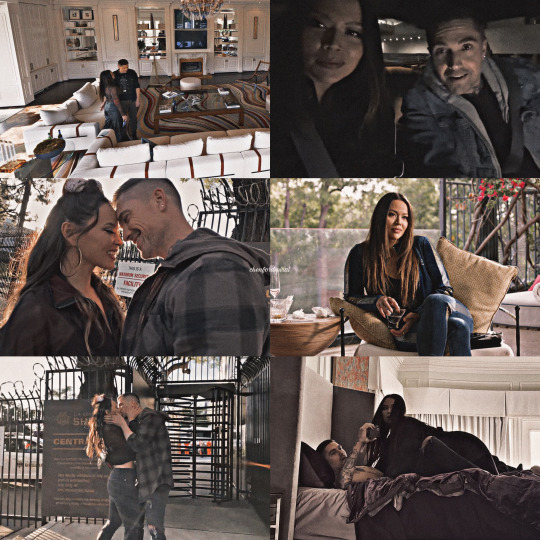
Tim and Lucy in every episode of The Rookie
Jake and Sava Edition
5x18 || Double Trouble
"Let's be bad."
#chenford#the rookie#sava wu#jake butler#tim and lucy in every episode of tr#kind of anyway haha#these two are WILD#5x18#idc this counts as tim and lucy for me
86 notes
·
View notes
Text
No but listen… I know how this documentary tried to portray Sava & Jake's relationship as a foreshadowing for what could happen to Tim and Lucy. But to me, it just emphasised all the differences. Sava and Dim were all about the thrill and the fast life, but it was all built on an illusion. A very hot one. But it doesn't mean much in the end, when it crumbles. When faced with the lies and deceit.
Tim and Lucy have built their relationship on stronger foundations. It's not perfect, no relationship ever is… But it's based on mutual respect and love and they know what they have is precious… And that's their treasure.
It just highlighted how solid they are. Because like Tim and Lucy said, they are in a really beautiful place and that's all that matters.
#The rookie#Chenford#Lucy Chen#Tim Bradford#Jake 'Dim' Butler#Sava 'Juicy' Wu#Little notes on a piece of paper#5.18
192 notes
·
View notes
Note
And you know I always want to hear more about the YJ WIP, so Young Justice: Fenix
I'm going to switch things up a bit here. For those who might not know, that's how I call a Jason-centric, longfic WIP of mine set in the Young Justice (cartoon) universe. It takes all four seasons as canon (it cherry picks re: the tie-in comics), and mixes some of my headcanons regarding Jason's character in it with some mainline comics canon that I don't think would apply to the show, but that serve my purposes. AND it throws in some dcau canon (but making it my own) for good measure.
Though the story is largely about Jason, the collision with his old life and the reunion with his family, it's told in multiple POVs. Mainly to advance the plot and not just write a navel-gazing Jason angst fest xDD. I thought I'd list the characters that get to have POVs, and tell you a bit of what they'll be bringing to the story. In order of appearance:
Talia al Ghul. The story opens with her! She's the main plot-mover, because she's in the thick of the actual conflict (vs. the new league of shadows + the light), preparing and moving pieces so things go the way they're supposed to. The dynamic between her and Jason is shaping up to be interesting too: it's different from how I see their comics relationship, AND different from the fanon mother-and-son dynamic. There's some of that, maybe, but due to circumstances and the large gap between him and Damian in this canon (nearly 20 years), he funcitons more as a parental figure than a brotherly one... cue spousification añsdklfjasdf. It's been fun to write.
Jason Todd. He's the main guy. He's going through it xD (also, this version of him didn't go into a pit, so he's healed the slow way and that's had an effect on him.
Dick Grayson. He's running point on The Superhero Side of things, as a leader, as a link between various sets of the plot, etc. His relationship with Jason is still forming. They are closer in age and (in my head) they actually shared time and space in the manor, as brothers, which makes some things easier and something more complicated. He also offers a counterpoint to Bruce (next one). In every instance we see into Bruce's head, we see that (although he rarely exteriorises it), he thinks about Jason. Dick doesn't, he has a mental block the size of a country. Until things come crashing down... very close to his birthday...
Bruce Wayne. He's there to suffer! I say this with affection because yj!Bruce is better than most Bruces but. I enjoy putting him through the ringer. I'm giving him angst about Jason, I'm giving him angst about Damian, I'm giving him angst about this-mysterious-red-hooded-guy... even about Alfred, and about other things I still haven't ironed out completely lmao.
Damian al Ghul. He's at the center of the conflict, what our mains are protecting above all. He's six years old. My goal is to strike a balance with his character, because otoh, yj offers a different version of the al Ghuls, which would change things, but I do love comics!Damian and the edges he comes with. His relationship with Jason tugs at my heartstrings.
Dinah Lance. She has a much smaller part than the ones above, but she has a couple of POV sections of her own. One of the first scenes I wrote for this fic was a therapy session with Bruce shortly after Jason's death, and I didn't want her to be in the fic *just* for that lol. She offers a little insight into the Senior League, into how (what in this world is) a very public child hero's death affected things, etc.
Cassandra Wu San. I simply find this (very, very different) version of Cass fascinating and wanted in her head. I wanted to show her perspective on the other bats, Barbara (who hasn't gotten a POV herself because this version of the character is simply more interesting through Cass's eyes) and Bruce in particular. And I also thought that, timeline-wise, it'd fit that she might've met Jason as the Red Hooded Ninja if they were in the League of Shadows around the same time. So that's fun.
Artemis Crock. I wanted someone on the original team to have a POV as well, and she was the immediate best choice. She can help move the plot on that side (here she's the new team leader), she has insight on the Shadows as well (Jade is also around btw!), I imagine as the teammate who Jason would've connected with the quickest, and we get to see some of her conflicting feelins re: an old teammate being resurrected... and not being the one she misses the most.
Tim Drake. He caused me a lot of headaches because a.) the show version of Tim is really... just there and b.) I started properly planning the fic at a time where I wasn't feeling particularly kind towards comics!Tim. Luckily for my peace of mind I got over that lol, but even then, that period made it so I put extra effort with this character and the result is that he has his own parcel of the plot LOL. Featuring undercover mission, archeology digs, among other treats for him. His dynamic with Jason is complicated (Jason has a lot of feelings that are really more about himself than about Tim, but Tim is sort of in the way of dealing with those lol), added with the fact that when they meet, Jason is still keeping his identity under wraps and he can't air all of that out... yet xD
So basically: the Waynes (though Tim wasn't ever adopted in this version of canon, in my head; his step-mother is still around) or inner batfam circle + Talia + one member of the team + one member of the JL.
ask me about my wips!
#replies#talking to the void#my thoughts#dc#dc thoughts#young justice#young justice wip#writing woes#jason todd#talia al ghul#dick grayson#bruce wayne#damian al ghul#damian wayne#dinah lance#cassandra wu san#cassandra cain#artemis crock#tim drake#artemis tag#ty!
23 notes
·
View notes
